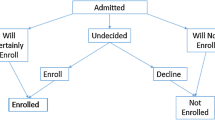Abstract
I study a college-admissions model with two need-blind colleges and heterogeneous students. In a game in which colleges can choose a financial aid policy and either binding, nonbinding, or no early admissions, a unique equilibrium outcome exists. In equilibrium, the more prestigious and wealthier college is more selective, has a more generous financial aid policy, and offers nonbinding early admissions, whereas the other college offers a binding program. Compared to the counterfactual in which only regular admissions are offered, early admissions make the more prestigious college worse off, the other college better off, and students, in the aggregate, better off.
Similar content being viewed by others
References
Afacan, M.O., Aliogulları, Z.H., Barlo, M.: Sticky matching in school choice. Econ. Theory 64(3), 509–538 (2017)
Antecol, H., Kiholm Smith, J.: The early decision option in college admission and its impact on student diversity. J. Law Econ. 55(1), 217–249 (2012)
Ashby, C.: Higher education: Schools’ use of the antitrust exemption has not significantly affected college affordability or likelihood of student enrollment to date. report to congressional committees. GAO-06-963, Government Accountability Office (2006)
Avery, C., Levin, J.: Early admissions at selective colleges. Am. Econ. Rev. 100(5), 2125–56 (2010)
Avery, C., Fairbanks, A., Zeckhauser, R.J.: The Early Admissions Game. Harvard University Press (2009)
Avery, C., Glickman, M.E., Hoxby, C.M., Metrick, A.: A revealed preference ranking of us colleges and universities. Quart. J. Econ. 128(1), 425–467 (2012)
Chade, H., Lewis, G., Smith, L.: Student portfolios and the college admissions problem. Rev. Econ. Stud. 81(3), 971–1002 (2014)
Chapman, G., Dickert-Conlin, S.: Applying early decision: student and college incentives and outcomes. Econ. Edu. Rev. 31(5), 749–763 (2012)
Che, Y.K., Koh, Y.: Decentralized college admissions. J. Polit. Econ. 124(5), 1295–1338 (2016)
Chen, Y., He, Y.: Information acquisition and provision in school choice: a theoretical investigation. Economic Theory (Forthcoming) (2021). https://doi.org/10.1007/s00199-021-01376-3
Epple, D., Romano, R.E.: Competition Between Private and Public Schools, Vouchers, and Peer-Group Effects. American Economic Review pp 33–62 (1998)
Epple, D., Romano, R., Sieg, H.: Admission, tuition, and financial aid policies in the market for higher education. Econometrica 74(4), 885–928 (2006)
Fetter, J.H.: Questions and Admissions: Reflections on 100,000 Admissions Decisions at Stanford. Stanford University Press (1997)
Harvard University (2011) Early action returns. https://news.harvard.edu/gazette/story/2011/02/early-action-returns/
Hill, C.B., Winston, G.C.: Access: net prices, affordability, and equity at a highly selective college. Econ. Edu. Rev. 25(1), 29–41 (2006)
Kaganovich, M., Su, X.: College curriculum, diverging selectivity, and enrollment expansion. Econ. Theory 67(4), 1019–1050 (2019)
Kim, M.: Early decision and financial aid competition among need-blind colleges and universities. J. Public Econ. 94(5–6), 410–420 (2010)
Lee, S.H.: Jumping the curse: early contracting with private information in university admissions. Int. Econ. Rev. 50(1), 1–38 (2009)
Nei, S., Pakzad-Hurson, B.: Strategic disaggregation in matching markets. Available at SSRN 2523224 (2021)
The Chronicle of Higher Education Harvard plans to end policy of admitting students early by eric hoover (2006). https://www.chronicle.com/article/Harvard-Plans-to-End-Policy-of/31368/
Author information
Authors and Affiliations
Corresponding author
Additional information
Publisher's Note
Springer Nature remains neutral with regard to jurisdictional claims in published maps and institutional affiliations.
Supplementary Information
Below is the link to the electronic supplementary material.
Rights and permissions
About this article
Cite this article
Murra-Anton, Z. Financial aid and early admissions at selective need-blind colleges. Econ Theory 74, 833–870 (2022). https://doi.org/10.1007/s00199-021-01379-0
Received:
Accepted:
Published:
Issue Date:
DOI: https://doi.org/10.1007/s00199-021-01379-0




